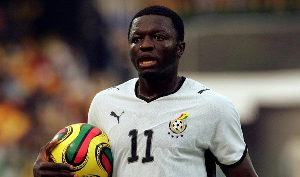“There is only one home to the life of a river-mussel; there is only one home to the life of a tortoise; there is only one shell to the soul of man; there is only one world to the spirit of our race. If that world leaves its course and smashes on boulders of the great void, whose world will give us shelter?” (Wole Soyinka, “Death and the King's Horseman”).
Kennedy Agyapong wakes up one day and declares IGP John Kudalor “an asshole.” One wonders whether it is the IGP or rather Ken’s vulgar tongue that is “an asshole.” The reactionary, alarmist Ken, the Father of Vulgar Politics, is also a product of ectopic pregnancy and brash demagoguery. His idiosyncratic flourish of political buffoonery is probably on the same wavelength as Donald Trump’s.
But he is not the only one in that exclusive, enviable league of political psychopaths. Schizophrenic doomsday prophesier, Owusu Bempah wakes up after Kennedy Agyapong, a stupendous psychobabble of a narcissistic politician and legislator, and asks the public to burn down his church if Akufo-Addo, the Machiavellian Merlinesque deity of the former’s [Owusu Bempah] twisted religious psephocracy, does not win the upcoming general elections
Calling that insider-trading, big-pimping brothel a “church,” a place probably meant exclusively for a flash mob, offers a troubling insight into the damning symptomatology of a revered sociopath. One day “church” is a congregation of human beings that meets at a designated location to commune with God, yet the next day that same “church” is a building.
That congregation of souls is even called the Body of Christ. Can the Body of Christ be burnt down?
Does the soul follow the rational trajectory of emergentism as in psychology or chemistry? Does the soul share in the empire of elisionism?
Is it possible to conceptually evaluate the soul from the point of view of eliminativism (elimatinative materialism)?
What of the point of view of metempsychosis, of the “Egyptian Book of the Dead” (or “Book of Coming Forth by Day”)?
Is the soul even reducible in material terms?
Is the soul supervenient? Or better yet, is the soul reducible or destructible according to Judeo-Christian principles?
Something is surely amiss here:
Let us assume, for the sake of argument, that Akufo-Addo does not win the general elections, then, as Owusu Bempah had already concluded, the Electoral Commission would be the one blame.
Does Owusu Bempah have a soul and if so, will he be willing to give it up to be burnt down together with those of his congregation?
“Everybody want to go to heaven; but none of them, none of them want to die,” sang Peter Tosh on “Equal Rights.”
On the other hand what if Owusu Bempah who has a sex swing tired around his parochial faculty, has been lying about his cocksure augury all along, or that his phenological, chromatophoric and shilly-shallying God changes his mind at the eleventh hour?
“For my thoughts are not your thoughts, neither are your ways my ways, saith the LORD.”
Certainly it was not Owusu Bempah’s God who made this statement.
Where has become of the Nkrumahist soul of Ghana? Dead? Buried? In coma or vegetative state?
Is Ghana the ex-girl or the next girl? Which of these politicians and religious leaders is the ex-girl or the next girl?
We do not know. Ask their God, Oh Ghana!
And now, here is Kwame Nkrumah:
“Countrymen, the task ahead is great indeed, and heavy is the responsibility; and yet it is a noble and glorious challenge—a challenge which calls for the courage to dream, the courage to believe, the courage to dare, the courage to work, the courage to achieve—to achieve the highest excellences and the fullest greatness of man. Dare we ask for more in life?
We have not asked this pertinent question let alone even begin to address it!
All the daring propensities we have as a people and pride ourselves on seem to have been channeled into public corruption, into drying up the national coffers thereby forcing the state of affairs into in a mode of arrested development.
At least we can begin to look at our situation as Appiah, the other Kwame, describes it:
“I started philosophy looking for answers. But along the way I came to prize exploring the questions. Progress in philosophy consists, I think, in a clearer delineation of the conceptual options, not in reaching determinate conclusions.”
Here, where Appiah looks at the human condition from the exclusivist viewpoint of philosophy, Dompere takes a holistic look at the human condition beyond the exclusivist prism of philosophy, to include the ideational rigor of the scientific method and mathematics, a discursive extension of Nkrumah’s “Consciencism: Philosophy and Ideology for Decolonization.”
The scientific method and mathematics give us a testable paradigm of the human condition.
Here (both books authored by the eminent mathematician, philosopher, logician, historian, management scientist, statistician, financial and policy analyst Dr. Kofi Kissi Dompere):
1) “The Theory of Philosophical Consciencism: Practice Foundations of Nkrumaism” (http://adonisandabbey.com/book_detail.php?bookid=231) (ISBN: 978-1-909112-66-7)
2) “The Theory of Categorial Conversion: Rational Foundations of Nkrumaism.” (http://adonisandabbey.com/book_detail.php?bookid=232) (ISBN: 978-1-909112-67-4).
FOOD FOR THOUGHT
The point of mentioning healthy secularism is to draw attention to the fact that it allows for plurality and idiosyncrasies in a unitary nation-state such as ours. Healthy secularism does not deny the existence of transcendental truths or otherwise, nor does it condone the reactionary imposition of theocracy, say, on the Ghanaian body politic.
Healthy secularism represents a unifying knot around the neck of the seeming heterogeneity of the Ghanaian unitary state. Diversity in unity is the basic infrastructure of this progressive unitary state founded by Kwame Nkrumah. It is in the diversity of humanity and ideas that the true greatness of nations lies.
Healthy secularism, therefore, represents a powerful riposte to centrifugal moral-social forces likely to result from any form of monolithic authoritarianism such as theocracy. Not even should the kind of political theology which Owuse Bempah represents be absorbed into the unifying secularity of the Ghanaian public.
Citizens are free to practice their beliefs in a spirit of tolerance and inclusivity but within an atmosphere of unequivocal demonstration of patriotic reference for constitutional secularity and diversity.
It should never be otherwise as we see it.
CONCLUDING REMARKS
Development, development economics and development sociology are either agents or products of national discourse, of dialogue in the supreme national interest although, of course, the very nature of our executive dominance and schadenfreude partisan politics more often than not excludes the participating consensus of popular sovereignty from this grid of national discourse.
It is the case that the kind of schadenfreude psephocracy we have in place does not appear to hold all the answers to the challenging conundrums posed by the human condition.
A radical rethink of the status quo is certainly in order. A rethink is crucial not in religious terms, but from the viewpoint of the idea of secular pragmatism on which the Ghanaian body politic was built.
What crime category should the police consider for the special case where Owusu Bempah’s church is burnt down in the event that Akufo-Addo loses the general elections? Should it be considered arson, an act of patriotism and of humanism, terrorism, or an act of love? Or of oblation?
Owusu Bempah should be promoting positive criminality in the Ghanaian body politic rather than emotional investment in apocalyptic alarmism. Theocracy or hierocracy is therefore not the answer. The notion that theocracy or political theology should be considered a catholicon is dangerous.
Granted, how will burning down Owusu Bempah’s church prove the veracity or otherwise of his cocksure augury? Is his God compatible with or reducible to the dialectic of forensic pragmatism?
What is more, soul is not as easy to define as spirit. Both are as clear as indeterminate and nebulous. The conflict between religious convictions and secular statehood is as clear as the indeterminate contours of soul and spirit. Thus burning down his church will not prove a thing.
It only reflects his religious delusion and intellectual insecurities. Ghanaians always think a public figure like Owusu Bempah who is often seen in impeccable tailored suits cannot be costumed in psychiatric illness. One does not have to go naked and eat from dumpsters in order to be considered mentally ill or to pass the test of mental deterioration.
Then this Kennedy Agyapong, who is known for going off on a tangent on the spur of the moment, should never have been given a mandate as a legislator in the first. His rhetorical indiscretions and vulgar style of political communication are as stupendous as the bloated contours of Koku Anyidoho and Sam George and as the flyspecked anatomic geography of the culicid political wisecracker, Asiedu Nketia.
Perhaps we can understand why Ghana is in the state it is now!
Opinions of Sunday, 20 November 2016
Columnist: Kwarteng, Francis







![A file photo of the private jet [Image Credit: Yaw Pare via Facebook] A file photo of the private jet [Image Credit: Yaw Pare via Facebook]](https://cdn.ghanaweb.com/imagelib/pics/153/15348139.295.jpg)







